Click or tap once to cast the moon blocks (跋杯 “po̍ah-poe”) and hit the stamp to reset.
Continue readingCategory Archives: Religion
Temple Guys Get Gogo

My friend sent me this video which I thought was definitely worth sharing. We’re used by now to seeing scantily clad women dancing as part of traditional temple culture, but now the Homei Fute Temple (和美福德宮) in Changhua County is apparently appealing to a new demographic. Not sure if the new demographic is obasans or young gay guys, but I’m impressed:
I thought the funniest thing is when one of the older guys made as if he was going to join them on the trucks.
You can check out more of the fun and games on Instagram here (check out the guy’s story while it’s still up) and here.
Update:
Apple Daily have put out an article about it now too with more details. The article seems to be implying that the target audience is old ladies as opposed to the gays. I found something interesting in some of the quotes in the article (taken from Facebook):
「都是阿罵(嬤)在搶第一排」、「真的!很少看到阿罵拍的那麼高興」
“The front-row is full of old ladies”, “Really! It’s rare to see all the old ladies filming so happily”
The interesting part of this is humorous borrowing of 罵 (to curse/to scold) to form 「阿罵」(Mandarin: ā mà) in place of 「阿嬤」(Mandarin: ā mā) to try and replicate the sound of the Taiwanese: a-má (as the ma has a falling tone in Taiwanese).
Let the Weak Say, I Am Strong: The KMT as God’s Chosen People
I thought this was quite a creative campaign flyer from KMT Taipei city council candidate Wayne Chen (陳孝威).
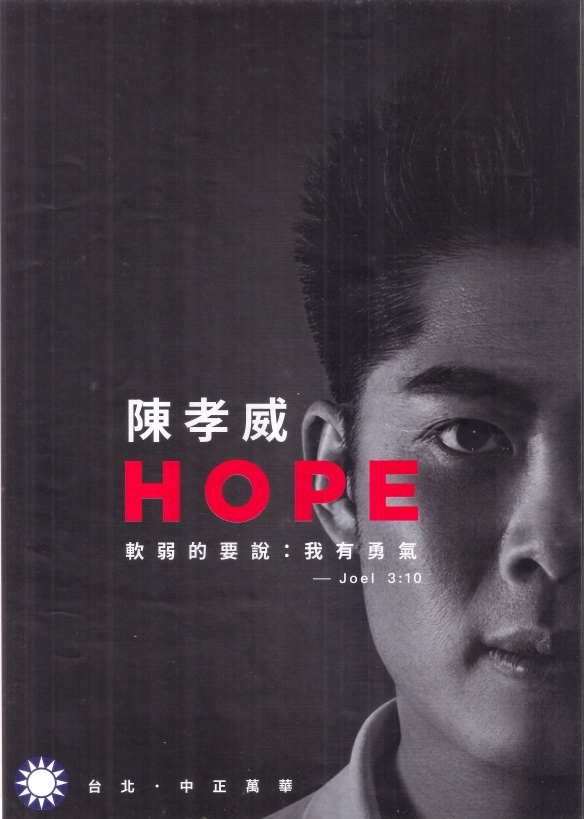
It has quite simple messaging, with his name, the word “HOPE” in English and then a quote from the Book of Joel (3:10):
軟弱的要說:我有勇氣
Let the weak say, I am strong
This phrase from the Book of Joel is used as a prophecy of God’s wrath against the enemies of the Israelites. This can be construed as an almost comical positing of the Kuomintang (KMT) as the “children of Jerusalem,” and, by extension, the Democratic Progressive Party (DPP) are presumably their enemies who “cast lots for My people, and have given a boy for a harlot and sold a girl for wine.” More generally you can see the phrase as a reference to the KMT’s current political straits after a massive electoral defeat in the Taipei mayoral elections and the presidential election, and much of their capital having been confiscated by the DPP’s independent Ill-gotten Party Assets Settlement Committee. The line quoted is preceded by the line “Beat your plowshares into swords and your pruninghooks into spears”, so I guess Ko Wen-je should prepare for war.
To be fair, he also quotes Helen Keller, along with the word “UNITY” in one of the other campaign flyers featured on his Facebook Page:
一己之力有限 一起之力無限
Alone we can do so little; together we can do so much
Although he’s also peppered his Facebook Page with a few other Biblical quotes, it also features him in a video which suggests he’s not as bellicose as suggested above (maybe he won’t sell the sons and daughters of the DPP “to a people far off”):
This is not an endorsement.
Pro-unification Signs in Ximen 西門町統一分子
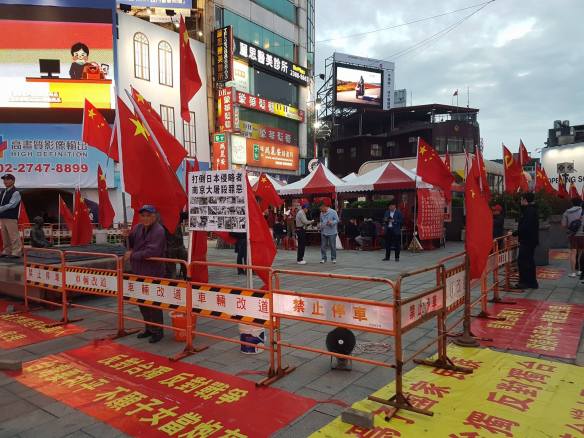
This old man holding a People’s Republic of China flag is standing next to a sign reading:
「打倒日本侵略者,南京大屠殺罪惡」 “Overturn the Japanese invaders, and the evil of the Nanjing Massacre”
[wpvideo oEpbm1sq]
「反對台獨,反對戰爭,台灣要和平,不願子女當炮灰」 “Oppose Taiwanese Independence, Oppose War. Taiwan should be in peace, so that our sons and daughters don’t become cannon fodder”
「什麼叫作92共識?92共識便是体現咱們都是中國人的意思。蔡英文是日本人嗎?蔡英文為什麼不承認92共識拖累我們?」What is the 1992 Consensus? The 1992 Consensus embodies the idea that we are all Chinese. Is Tsai Ing-wen Japanese? Why does Tsai Ing-wen hold us back by not acknowledging the 1992 Consensus.
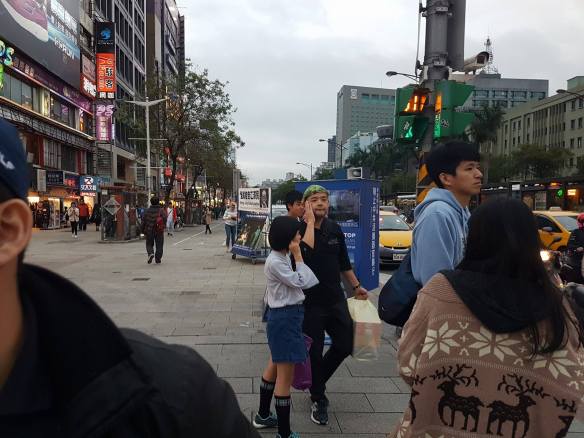
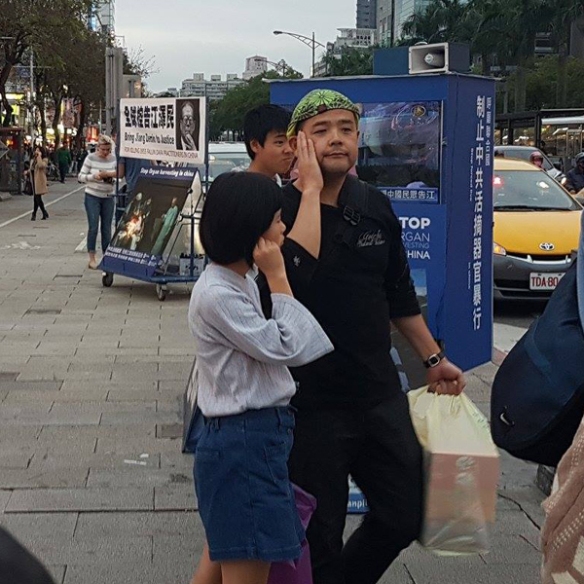
Messianic Jewish Endtime Ministries in Taiwan: On Gays, Abortion and the Sabbath
I’m always interested to see religious pamphlets when they come through my door, especially given the recent protests held by Taiwan’s Christian minority against the gay marriage bill.
Taiwanese president Tsai Ing-wen has treated these religious groups on the same footing as pro-gay marriage groups, despite a lot of misinformation spread by the former on the actual content on the bill (lots of talk of men marrying Ferris wheels and dogs).
Anyway, I got this leaflet through the door this week, which appears to be associated with or enamoured with the “Aleph & Tav Prophetic Endtime Ministries“, a sect of Messianic Judaism, and have translated selections of it that I thought were interesting as they relate to gay rights and abortion.
The first page is slightly odd, in that it first suggests that there has been an uptick in “earthquakes, floods, tornadoes, volcanic eruptions, heat waves, damage to crops from cold spells, epidemics and terrorist attacks” and then states that most of these are the result of how humanity has destroyed the earth’s environment. He then points out, that actually earthquakes and volcanic eruptions are not related to global warming, but are rather a sign of god’s anger. He goes on to state that effects of global warming are far beyond what many scientists predicted, so god’s probably making global warming worse for us too.
After this the author goes into a rant about the Sabbath being from Friday sunset to Saturday sunset, not Sunday as some Christians would have it. One line of this rant stood out to me:
不要再讓外邦人嘲笑我們不遵守十誡。
Don’t allow the people of foreign countries to continue to mock us for not observing the 10 Commandments.
This is interesting because it conflicts with statements made later on in the text, in which he criticizes Taiwanese people for blindly following Western conventions on the issue of abortion.
The second page is a little more interesting, and I’ve translated it in two parts. The first excerpt is as follows:
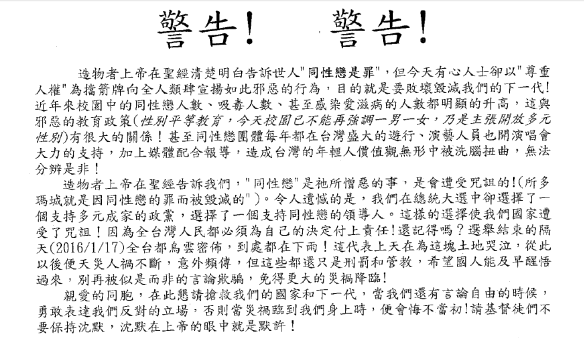
Warning! Warning!
The creator clearly tells humanity in the bible “Homosexuality is sin”, but nowadays, people with ulterior motives use “respect for human rights” as a shield to promote such evil behaviour among humanity. Their motive is to destroy and obliterate our next generation! Over recent years the number of homosexuals, drug users and even people infected with AIDS [sic.] on school campuses has clearly risen, which is closely related to the evil education policies (gender equality education, today in schools they no longer emphasize the idea of one man and one woman, but they advocate to allow for diverse genders)! There are even massive parades by homosexual groups in Taiwan every year, with singers launching concerts to support the cause and the media writing favourable reports about them, which has led to an intangible brainwashing and warping of the value systems of Taiwan’s young people so that they can no longer tell right from wrong!
The creator tells us in the bible that “homosexuals” are an object of his scorn, and are accursed! (The city of Sodom was destroyed because of the sin of homosexuality). What is most regrettable is that during the presidential election we chose a political party that supports diverse families and we chose a leader who supports homosexuals. This choice has led our country to be cursed! As all the people of Taiwan must take responsibility for their decision! Do you still remember? The day after the election (January 17, 2016) their were dark clouds in the skies all over Taiwan, and it rained everywhere! This is a sign that the heavens were weeping for this accursed piece of land, from that time onward there has been natural disaster after natural disaster, with frequent news of accidents, but this is just punishment and discipline, in the hope that our compatriots can wake up to this as soon as possible, and be cheated by this disingenuous rhetoric no longer, to prevent an even bigger disaster befalling us!
Dear compatriots, we hereby implore you to save our country’s next generation, to clearly express your opposition while we still have freedom of speech, otherwise when a disaster befalls us and we will be left with nothing but regret! We ask that Christians not remain silent, as silence is tacit agreement in the eyes of the lord!
Variant radicals on parade with the Tudigong: 「蹺境/遶境/繞境」
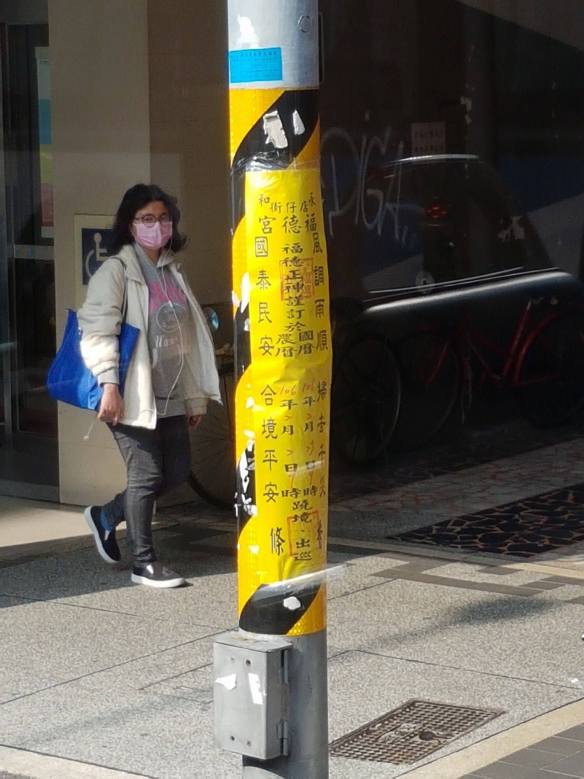
I saw this notice stuck on a traffic light from the bus this morning.
These notices are stuck along lamp posts and walls when a temple parade is going to pass by this area. As well as including the blessings 「國泰民安」(a secure country and safety for the people), 「合境平安」(Peace for everyone and everything), 「風調雨順」(No rain or wind) and a fourth I can’t quite make out 「? 去? 千 ?」, the basic information is listed:
「店仔街福德宮
福德正神謹訂於
農曆106年2月2日9時
國曆106年2月27日9時
蹺境、出巡 」
Dianzai Street (lit. Vendor Street) God of the Earth Temple Notice
The God of the Earth (also known by the name Tudigong, but here Fudezhengshen) is set
on the 2nd day of the 2nd month of the 106th year (sic.) of the lunar calendar
on the 2nd day of the 2nd month of the 106th year of the Republic of China
to tour the streets on inspection.
What should be noted here, is that according to the lunar calendar, this is the 丁酉 year, not the 106th year (a borrowing from the National calendar).
There’s also what I think is probably either a mistake, or an attempt to render the notice in Taiwanese, with the use of the character 「蹺」 (qiao1) instead of 「遶」 or 「繞」 (both variants of each other) in the phrase 「繞境」。
A quick Google search can confirm that it was probably a mistake, as there are only 1,390 results for 「蹺境」 overall, and only one result in a news search. Whereas 「遶境」 produces 515,000 results overall, and 85,200 results in a news search, and 「繞境」 produces 423,000 results overall, and 17,700 results in a news search.
MRT Poetry: ‘City of Faith’ by Tien Huan-chun 捷運之詩:田煥均的〈信仰之城〉
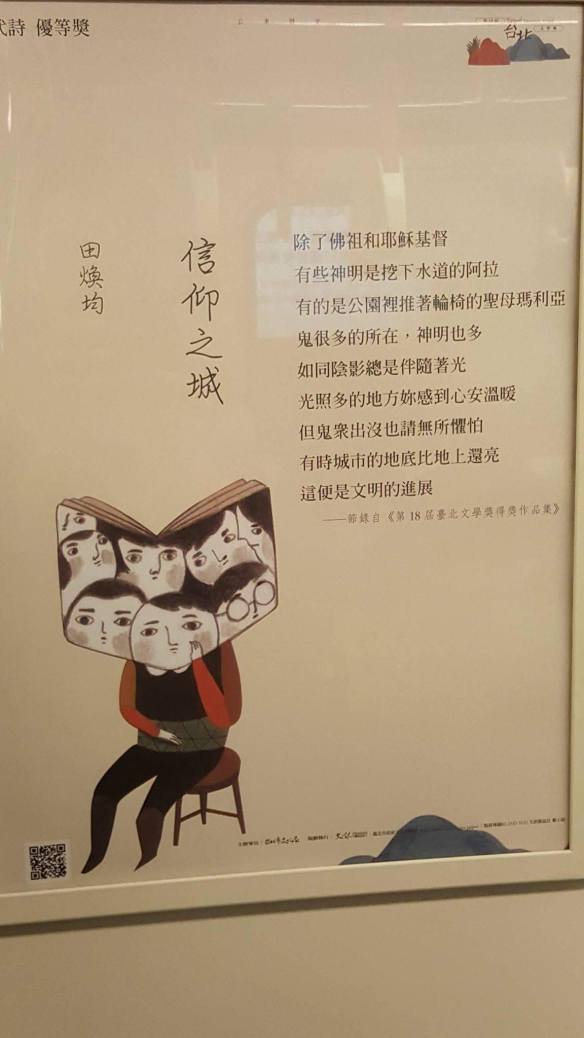
信仰之城 City of Faith
除了佛祖和耶穌基督
As well as Buddhism and Christianity
有些神明是挖下水道的阿拉
Some gods dig water channels like Allah
有的是公園裡推著輪椅的聖母瑪利亞
Some are the Holy Marys pushing wheelchairs in the park
鬼很多的所在,神明也多
Where ghosts thrive, gods thrive too
如同陰影總是伴隨著光
As shadow follows the light
光照多的地方妳感到心安溫暖
Where light shines strongest you feel secure warmth
但鬼眾出沒也請無所懼怕
But don’t fear the places where ghosts roam
有時城市的地㡳比地上還亮
Sometimes the city’s depths are lighter than its surface
這便是文明的進展
This is the advance of civlization
Reunification activist, or just a crazy guy in a car? 統一份子/瘋子?

Have been showing my little sister round Taipei, which occasioned the customary visit to Taipei 101. After the guided audio tour around the top – which is basically an extended advertisement by the Taipei City Government – and the trawl through the layers of gift shops set up to make it feel like a complete tourist trap, we descended back to ground level and caught sight of this guy driving around the district:
The message on top of the car says “Long live China” then underneath it says “We’re all one family”. He’s a pro-reunification activist – hoping that China can incorporate Taiwan, which is currently an independent country – although the majority of people I saw reacted to him more with incredulity or amusement than anything else.
The area outside Taipei 101 is often an interesting place to visit, as Falungong practitioners meet with mainland tour groups, along with other tourists. Falungong is banned in Mainland China, after a mass rally was organized by practitioners, which Beijing saw as a threat to its authority.
Paul Farrelly, a doctoral candidate at Australian National University and contributor to eRenlai, did a slideshow on the Falungong protesters which gather around the main sites visited by mainland tourist groups in Taipei, watch it here:
Restless spirits on the Heping Line 安撫和平幹線上的冤魂
On the bus to work this morning, I saw these stickers stuck below seats on the bus. They were stuck on in a rather inconspicuous way, which suggested they weren’t necessarily there to be seen.
I’d downloaded a program at work called Mojikyo, which allows you to type obscure and antiquated Chinese characters – which don’t have a unicode assignation (a system that allows for consistency in characters across different systems), as well as oracle bone and seal scripts, into Word with special fonts which modify modern Chinese characters. It also has something called Siddham characters, which I later learned from Wikipedia is a form of Sanskrit. I recognized the characters from in the picture below from playing around with the program:

I worked out that the character on all four of the outer sides of the picture were all the Siddham character ![]() . Through a little guess work I found out that the two vertical pillars within the circle were Buddhist mantras associated with Guanyin (觀音), also known as Guanzizai (觀自在) and Avalokiteśvara – who is incredibly popular in the Chinese-speaking world, and is known for his/her compassion for the suffering of humanity.
. Through a little guess work I found out that the two vertical pillars within the circle were Buddhist mantras associated with Guanyin (觀音), also known as Guanzizai (觀自在) and Avalokiteśvara – who is incredibly popular in the Chinese-speaking world, and is known for his/her compassion for the suffering of humanity.
[On a side note, the ambiguity of Guanyin’s gender came under fire recently from a Christian preacher Kuo Mei-chiang (郭美江), whose comments sparked public outrage in Taiwan:
She starts off this diplomatically by saying: “Guanyin, this evil spirit, is neither male nor female…”
She’s also paranoid that Taiwan’s universities are being “invaded by gays” but that’s another story for another day. Back to Guanyin mantras on the bus…]
The mantras seem to be the same as this one:

It is pronounced “oṃ ma ṇi pa dme hūṃ” according to a website on different Buddhist mantras, which has been translated to English as “oṃ the jewel in the lotus hūṃ”, although there are questions about this translation which you can find out more about at the website.
One of my Taiwanese friends whose family is quite heavily into Buddhism told me that the first sticker is the “大寶廣博樓閣善住祕密陀羅尼咒輪” and that the second, which is below, is the “四解脫咒輪”, written in Tibetan script.
“大寶” can mean bodhisattva, or Dharma, “廣博” is broad or expansive, “樓閣” is pavilion, “善住” is one of the 36 guardian deities that is in charged with protecting from deadly injuries. “陀羅尼” is the Chinese for Dhāraṇī – which is a kind of protective charm which summarizes the meaning of a sutra.

The first sticker would seem to be to protect people from deadly injury, while the second is to help the dead move on after they’ve died, which fits in with what my friend told me when he said that it was likely that the bus had been in a deadly accident before, and the stickers were an attempt to exorcise the spirits of the dead. He said it wasn’t definitely the case but it was a possibility, and that this is part of Taiwanese culture, and it reminded me of my curiosity at flowers being tied to fences at the side of the road in the countryside in Ireland at accident black spots.
If anyone has any more information or corrections to make, suggestions are welcome in the comments section.
I’m going to continue to try and decode the Siddham characters on the first sticker, and will update in the comments section too. Here’s a list of websites I found pretty useful:
References:
Visible Mantra : Buddhist Calligraphy: http://www.visiblemantra.org/avalokitesvara.html
Mojikyo: http://www.mojikyo.org/ (the content has to be downloaded from another site though, see this site for tips on how to get the fonts and the character map: http://tinyapps.org/blog/windows/201002130700_mojikyo_character_map.html )
A Dictionary of Chinese Buddhist Terms: http://mahajana.net/texts/kopia_lokalna/soothill-hodous.html


